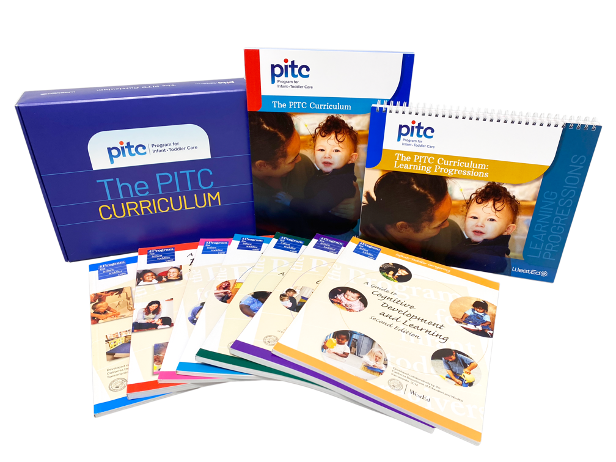WestEd
The PITC Curriculum Bundle
The PITC Curriculum Bundle
The PITC Curriculum Supports Discovery, Amazement, and Marvel for Infants and Toddlers

For more information about the new PITC Curriculum, or to schedule curriculum implementation training, please contact Amber Morabito.
Enhancing the relationship-based, responsive approach to early care promoted by the Program for Infant/Toddler Care (PITC), new PITC Curriculum planning tools and strategies support the efforts of family care providers and center-based teachers to facilitate high-quality individualized learning and healthy development for children from 0-3. Unique to the PITC Curriculum is a planning process based on reflection, observation, and documentation of play and learning that respects each child’s developing abilities, individual strengths and needs, family culture(s), and language(s). This planning process helps teachers deepen understanding, share meaning, support learning, and strengthen meaningful, caring relationships with infants and toddlers.
What’s Included?
The PITC Curriculum Book
Introduction to the PITC Curriculum
Part 1: The Philosophical Foundations of the PITC Curriculum
Chapter 1: Curriculum That Connects with the Infant’s Learning Agenda
Chapter 2: The First Step: Relationship Planning
Chapter 3: An Overview of the PITC Approach to Curriculum Planning
Chapter 4: Program Leader Support for Curriculum Planning
Chapter 5: How We Know the PITC Curriculum Is Working
Part 2: PITC Curriculum Planning
Chapter 6: Curriculum Planning Step by Step and Moment by Moment
Chapter 7: The Reflective Curriculum Planning Process
Chapter 8: The PITC Curriculum Planning Tools
Chapter 9: Small Group and Individual Goal Planning
Chapter 10: Rich Learning Environments and Developmentally Appropriate Routines
Chapter 11: Necessary Ingredients, Inquiry, Wonder, and Reflection
Appendices
Appendix A: PITC Curriculum Planning Tool
Appendix B: PITC Curriculum Fidelity Tool
Appendix C: Crosswalk Between the Head Start Early Learning Outcomes Framework (ELOF) and the California Infant/Toddler Learning & Development Foundations
Appendix D: Examples and Samples of PITC Curriculum Planning Resources
The PITC Learning Progressions Book
Includes five domains: Approaches to Learning, Social and Emotional Development, Language and Communication, Cognition, and Perceptual, Motor, and Physical Development
Seven PITC Caregiver Guides (Published by CDE)
A Guide to Cognitive Development and Learning (Second Edition)
A Guide to Creating Partnerships with Families (Second Edition)
A Guide to Social-Emotional Growth and Socialization (Second Edition)
A Guide to Culturally Sensitive Care (Second Edition)
A Guide to Language Development and Communication (Second Edition)
A Guide to Routines (Second Edition) A Guide to Setting Up Environments (Second Edition)
The PITC Curriculum can be purchased and used independently, but is most effective when used in conjunction with dynamic PITC Curriculum Implementation Training, led by experts in early learning and care. Training includes:
- Engaging, interactive, knowledgeable support facilitated by a PITC-authorized trainer (four 2-hour sessions)
- High-quality resources and materials to extend the curriculum and enhance learning and participation in training
- Expanded technical assistance to support your implementation
For more information about the new PITC Curriculum or to schedule curriculum implementation training, please contact Amber Morabito.
Author(s): Peter Mangione, J. Ronald Lally, Diane Harkins, Amber Morabito, with Arlene Paxton
ISBN: 978-1-938287-89-3
Copyright: 2021
Format: Curriculum Bundle
Pages:
Publisher: WestEd
Couldn't load pickup availability
Share

